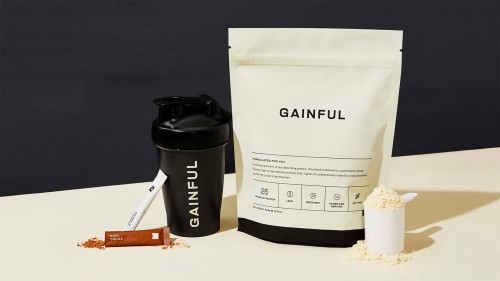Health Benefits of Whey Protein Explained by a Dietitian
Published on April 8, 2022
Medically Reviewed by Anastasia Climan, RDN, CD-N
Whey is a popular type of protein often used to help reach protein goals for the day and increase muscle mass. There are many benefits associated with taking whey protein, and research has shown a therapeutic effect as well. Read on to learn what whey protein is, the benefits, side effects, and potential risks.


What Is Whey Protein?
Milk contains two different proteins, whey and casein.
When making cheese, whey protein is a byproduct, which means it is produced during the process of making cheese.
After whey protein is separated from cheese, it goes through various processing steps to form a powder.
Different types of whey protein are created using various processing techniques. (1)
There are three main types:
-
Concentrate: Whey protein concentrate contains anywhere from 35%–80% protein and 20% carbohydrates and fats. It contains the highest amount of lactose, although it is still considered a low level. It is found in many protein powders, bars, nutritional products, and some infant formulas. (2, 1)
-
Isolate: Isolate contains around 90% protein, and less carbohydrates and fat compared to concentrate. It is better suited for those with lactose intolerance as it contains less lactose than concentrate. Isolate can be found in protein supplements like powders and bars. (2, 1)
-
Hydrolysate: Hydrolysate is digested faster and has been shown to improve muscle protein synthesis (how the body builds muscle) better than the other two forms of whey. Because it is the most processed whey, often considered “pre-digested”, it may be easier to digest for those with stomach issues. Hydrolysate can be found in protein powders, specialized infant formulas, and medical supplements for nutritional deficiencies. (3, 4, 2, 1)
All three types of whey contain similar amino acid profiles. (1)
Whey protein is commonly used for building muscle and weight loss. You can mix whey protein powder in water, milk of choice, or a smoothie. It is also found in some protein bars and ready-made whey protein shakes.
Whey is easily digestible, meaning it is absorbed very quickly in the gut.
It also contains all essential amino acids and is especially rich in the essential amino acids called branched-chain amino acids (BCAAs). (5)
BCAAs are a specific type of amino acid known for their “branched-chain” chemical structure and may help increase lean body mass after exercise. (6)
Benefits of Whey Protein
Whey protein can provide many benefits, including aiding in weight loss, improving cardiovascular disease risk, and building and preserving muscle.
Weight Loss
One 2008 randomized, double-blind study, also known as the gold standard of studies, showed that those who took whey protein had increased weight loss and better-preserved lean muscle than those not on whey. (7)
This was over a 12-week period where one group consumed 20 grams of a whey protein beverage 20 minutes before breakfast and 20 minutes before dinner, and the other group drank a control shake with no whey protein.
Although both groups lost weight, the group on whey lost 6.1% of their body fat, which was significantly more than the control group. They also lost significantly less lean body mass. (7)
Newer studies have also shown positive results on weight with whey protein supplementation.
One analysis of 14 different studies involving 626 adults examined the effect of whey protein on strength training, weight, and body composition, the amount of body fat and muscle a person has.
Those on whey protein significantly decreased weight and body fat. In addition, when whey protein was paired with strength training, lean body mass significantly increased. (8)
A small 2021 study on a weight-loss intervention evaluated the effect of whey protein three times per week in combination with strength training.
Greater strength improvements were seen in those who had whey protein compared to those who did not include whey with strength training.
It was determined that whey protein is a low-cost supplement addition to a weight-loss intervention. (9)
It has been shown that even a 5% reduction in body fat can reduce the risk of obesity-related disease. This makes taking whey protein a practical way to decrease weight and improve health outcomes. (7)
Summary
Whey protein has been shown to aid in decreasing body fat and increasing lean body mass.
Decrease Muscle Loss
As you age, skeletal muscle loses its strength and mass. On average, we lose 3%–5% of muscle mass every 10 years after the age of 30, and at age 60, this decline is even more rapid.
Sarcopenia is the more severe and accelerated loss of muscle mass. It is more common among older adults. (5)
In those with sarcopenia, including 35 grams of whey protein daily can contribute to improvements in muscle mass.
In addition, whey protein combined with exercise can aid in lowering inflammation, which is typically higher in those with sarcopenia. (5)
One study showed that even two weeks of physical inactivity in combination with eating fewer calories can cause a significant reduction in lean mass.
In just one week, including whey protein in combination with normal physical activity, even walking, increased muscle protein synthesis, or the body’s ability to make lean muscle. (10)
Summary
Lean body mass decreases as we age. Particularly after the age of 60, there is a more rapid decline in muscle mass. In some cases, this leads to a more severe loss of muscle, called sarcopenia.
Including 35 grams of whey protein with physical activity can decrease muscle loss through the aging process and reduce inflammation.
Improve Heart Health
Cardiovascular disease is the main cause of death worldwide.
Including whey protein in the diet may help mitigate some of the risks associated with heart disease, like high blood pressure and abnormal cholesterol levels. (11, 12)
Protein amounts ranging from 1.0-1.5 grams per kilogram (0.45- 0.68 grams per pound) of body weight have been shown to increase good cholesterol, called HDL, decreasing cardiovascular disease risk. (12)
Including whey protein in the diet can help reach the desired level of daily protein.
A study in The American Journal of Clinical Nutrition showed that consuming whey protein daily for eight weeks lowered blood pressure in those with hypertension or pre-hypertension.
Whey protein also helped increase flow-mediated dilation, which is the widening of the arteries.
This is helpful for getting more blood flow to the heart and other areas of the body. These are important factors in improving cardiovascular health. (11)
In addition, a positive impact on lowering triglycerides may be seen with the addition of whey protein.
An analysis of 13 studies showed that although no effect was seen on total cholesterol, a significant impact was made on lowering triglycerides with the supplementation of whey. (13)
Summary
Whey protein may decrease cardiovascular disease risk by improving blood pressure, flow-mediated dilation, and triglycerides.
Getting 1.0–1.5 grams per kilogram, or 0.45–0.68 grams per pound, of body weight of protein daily can be helpful for improving cardiovascular health.
Supplementing whey protein can help reach daily protein goals.
What Dose of Whey Protein Should I Take?
Protein needs vary.
The Recommended Daily Allowance of protein is 0.8 grams per kilogram, or 0.36 grams per pound, of body weight. This is the amount needed to meet basic nutritional needs.
According to the International Society of Sports Nutrition (ISSN), taking 1.4-2.0 grams of protein per kilogram (0.64-0.91 grams per pound) of body weight is sufficient to support muscle growth and recovery for most individuals who are exercising. (14)
Most whey protein supplements contain around 25 grams of protein per scoop. Taking 1–2 scoops per day is a commonly recommended dose but will vary based on how much protein you are getting through food.
If your protein intake is already high, you may not need a whey protein supplement.
What Are the Side Effects of Whey Protein?
Consuming moderate amounts of whey protein is unlikely to cause side effects. But the majority of side effects related to whey protein are digestive issues.
Some people who are lactose intolerant may have issues digesting whey due to the lactose content.
Although whey protein does not have a large amount of lactose, people who are very sensitive to lactose may experience bloating, gas, stomach cramps, or diarrhea. (15)
If you have a milk allergy, you may be allergic to whey and should avoid it. (2)
It’s always best to speak with your doctor before adding a supplement like whey protein. (16, 17)
When it comes to protein powders, toxins should be of consideration as well.
A new report on toxins contained in protein powders has been released by a nonprofit group called The Clean Label Project. (18)
They tested 134 protein powders and found 75% had measurable levels of lead, and 33% exceeded the levels considered safe.
In addition, elevated levels of BPA, mercury, cadmium, and arsenic were found in some of the powders. Of the protein powders tested, egg and whey protein were the cleanest.
However, it is important to buy high-quality brands of supplements, including protein powders, as they are not regulated by the FDA and may be contaminated. (18)
Look for brands that have third-party testing, which verifies the quality and product contents and ensures there are no contaminants.
In addition, you can research clean protein powders from resources like The Clean Label Project.
Frequently Asked Questions
What is whey protein?
Whey protein is a popular type of protein supplement.
Whey is produced during the process of making cheese. It is easily digested, meaning it is absorbed very quickly in the gut.
It also contains all essential amino acids, including being a rich source of branched-chain amino acids.
What are the benefits of taking whey protein?
Whey protein intake may be helpful for improving heart health, weight, lowering inflammation, and building and preserving muscle.
It has been specifically linked to increasing good cholesterol and lowering triglycerides, which can improve cardiovascular disease risk.
How much whey protein can I safely take?
A typical dose of whey protein is 1-2 scoops which usually contains 25-50 grams of protein.
Protein needs will vary based on individual needs but will range from 0.8-2.0 grams per kilogram (0.36-0.91 grams per pound) of body weight.
You can calculate your protein needs and then decide if a supplement is necessary. You will not need a protein supplement if you get enough protein through foods.
Are their risks to taking whey protein?
Whey protein is a generally safe supplement to take.
Whey contains small amounts of lactose, so those with lactose intolerance may feel bloat, gas, stomach pain, or diarrhea when taking whey.
Protein powders may contain toxins like heavy metals and BPA. It is best to purchase supplements from a reputable company to avoid over exposure to these toxins.
In addition, if you have kidney or liver issues, speak with your healthcare provider before adding protein supplements.
The Bottom Line
Whey protein is a popular type of protein supplement. It is easily digested, meaning it is absorbed very quickly in the gut.
It also contains all essential amino acids, including being a rich source of branched-chain amino acids.
Research has shown that whey protein can:
- Aid in weight loss.
- Improve good cholesterol called HDL.
- Decrease triglycerides.
- Improve blood pressure.
- Lower inflammation.
- Protect against muscle loss, especially in aging populations.
You can mix whey protein powder in water, milk of choice, or a smoothie. It is also found in some protein bars and ready-made whey protein shakes.
Protein needs will vary based on individual needs and health goals, but whey protein can be a supplement to a diet that is lower in overall protein.
If you are getting enough protein through foods, you will not need a protein supplement.
Whey protein contains small amounts of lactose and may cause digestive issues for those with lactose intolerance.
Since supplements, including protein powders, are not regulated by the FDA, it is best to purchase high-quality brands and research clean protein powders from resources like The Clean Label Project.
At WellnessVerge, we only use reputable sources, including peer-reviewed medical journals and well-respected academic institutions.
- WHEY PROCESSING | Dairy Processing Handbook:
https://dairyprocessinghandbook.tetrapak.com/chapter/whey-processing - Whey Protein: Health Benefits and Potential Side Effects – Cleveland Clinic:
https://health.clevelandclinic.org/is-whey-protein-good-for-you/ - Effects of whey protein hydrolysate ingestion on post-exercise muscle protein synthesis compared with intact whey protein in rats | Nutrition & Metabolism | Full Text:
https://nutritionandmetabolism.biomedcentral.com/articles/10.1186/s12986-019-0417-9 - Comparison of digestibility and quality of intact proteins with their respective hydrolysates - PubMed:
https://pubmed.ncbi.nlm.nih.gov/18727562/ - Whey for Sarcopenia; Can Whey Peptides, Hydrolysates or Proteins Play a Beneficial Role? - PMC:
https://www.ncbi.nlm.nih.gov/labs/pmc/articles/PMC7353484/ - Frontiers | Branched-Chain Amino Acid Ingestion Stimulates Muscle Myofibrillar Protein Synthesis following Resistance Exercise in Humans | Physiology:
https://www.frontiersin.org/articles/10.3389/fphys.2017.00390/full - A whey-protein supplement increases fat loss and spares lean muscle in obese subjects: a randomized human clinical study - PMC:
https://www.ncbi.nlm.nih.gov/pmc/articles/PMC2289832/ - Effects of whey protein and resistance exercise on body composition: a meta-analysis of randomized controlled trials - PubMed:
https://pubmed.ncbi.nlm.nih.gov/24724774/ - Impact of whey protein supplementation in a weight-loss intervention in rural dwelling adults: A feasibility study - PubMed:
https://pubmed.ncbi.nlm.nih.gov/34620350/ - Randomized controlled trial of the impact of protein supplementation on leg lean mass and integrated muscle protein synthesis during inactivity and energy restriction in older persons | The American Journal of Clinical Nutrition | Oxford Academic:
https://academic.oup.com/ajcn/article/108/5/1060/5115704 - Whey protein lowers blood pressure and improves endothelial function and lipid biomarkers in adults with prehypertension and mild hypertension: results from the chronic Whey2Go randomized controlled trial | The American Journal of Clinical Nutrition | Oxford Academic:
https://academic.oup.com/ajcn/article/104/6/1534/4564684 - Higher-Protein Diets Are Associated with Higher HDL Cholesterol and Lower BMI and Waist Circumference in US Adults | The Journal of Nutrition | Oxford Academic:
https://academic.oup.com/jn/article/145/3/605/4743715?login=false - Effect of whey protein on blood lipid profiles: a meta-analysis of randomized controlled trials | European Journal of Clinical Nutrition:
https://www.nature.com/articles/ejcn201639 - International Society of Sports Nutrition Position Stand: protein and exercise | Journal of the International Society of Sports Nutrition | Full Text:
https://jissn.biomedcentral.com/articles/10.1186/s12970-017-0177-8 - Nutritional management of lactose intolerance: the importance of diet and food labelling - PMC:
https://www.ncbi.nlm.nih.gov/pmc/articles/PMC7318541/ - 8 Key Things to Know Before Taking Supplements | National Kidney Foundation:
https://www.kidney.org/content/8-key-things-know-taking-supplements-0 - Whey protein supplementation and its potentially adverse effects on health: a systematic review:
https://cdnsciencepub.com/doi/10.1139/apnm-2020-0370?url_ver=Z39.88-2003&rfr_id=ori:rid:crossref.org&rfr_dat=cr_pub%20%200pubmed - Protein Powder White Paper - Clean Label Project:
https://cleanlabelproject.org/protein-powder-white-paper/






